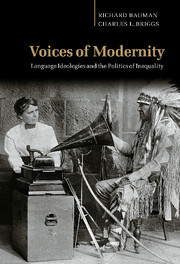Book contents
- Frontmatter
- Contents
- Preface
- 1 Introduction
- 2 Making language and making it safe for science and society: from Francis Bacon to John Locke
- 3 Creating modernity's others in seventeenth- and eighteenth-century England: antiquarian and philological inflections
- 4 The critical foundations of national epic and the rhetoric of authenticity: Hugh Blair and the Ossian controversy
- 5 Language, poetry, and Volk in eighteenth-century Germany: Johann Gottfried Herder's construction of tradition
- 6 Scientizing textual production in the service of the nation: the Brothers Grimm and Germanic philology
- 7 The making of an American textual tradition: Henry Rowe Schoolcraft's Indian researches
- 8 The foundation of all future researches: Franz Boas's cosmopolitan charter for anthropology
- 9 Conclusion
- References
- Index
2 - Making language and making it safe for science and society: from Francis Bacon to John Locke
Published online by Cambridge University Press: 22 September 2009
- Frontmatter
- Contents
- Preface
- 1 Introduction
- 2 Making language and making it safe for science and society: from Francis Bacon to John Locke
- 3 Creating modernity's others in seventeenth- and eighteenth-century England: antiquarian and philological inflections
- 4 The critical foundations of national epic and the rhetoric of authenticity: Hugh Blair and the Ossian controversy
- 5 Language, poetry, and Volk in eighteenth-century Germany: Johann Gottfried Herder's construction of tradition
- 6 Scientizing textual production in the service of the nation: the Brothers Grimm and Germanic philology
- 7 The making of an American textual tradition: Henry Rowe Schoolcraft's Indian researches
- 8 The foundation of all future researches: Franz Boas's cosmopolitan charter for anthropology
- 9 Conclusion
- References
- Index
Summary
For writers who like to tell the story of modernity in terms of a powerful rupture that took place in the seventeenth century, Francis Bacon provides a compelling point of departure. Not given to modest claims, Bacon entitled one of his works (published in 1620) the Novum Organum, seeking to pull the mantle off Aristotle's Organon (1949) and to displace “ancient philosophy” and the way it was used in colleges and universities of the day as a basis for inquiry, thereby establishing his own claim to fashion knowledge “anew from the very foundations” (1860b: 52). Bacon played a key role in the invention of nature, in the carving out of a domain that excluded humans and simultaneously seemed to be made just for them – to harness and control for their own mental and material progress. Providing a social and philosophical charter for experimental work, Bacon argued that nature tends to hide or obscure some of “her” properties; it is accordingly best to observe nature “under constraint and vexed; that is to say, when by art and the hand of man she is forced out of her natural state, and squeezed and molded” (1860b: 246). Experiments are thus needed to isolate the property in question and to force nature to reveal “her” secrets; the role of sense data could be limited to judging the results of the experiment.
- Type
- Chapter
- Information
- Voices of ModernityLanguage Ideologies and the Politics of Inequality, pp. 19 - 69Publisher: Cambridge University PressPrint publication year: 2003

